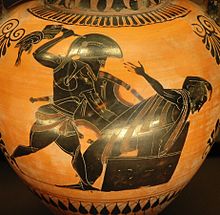Priam

In Greek mythology, Priam (/ˈpraɪ.əm/; Greek: Πρίαμος Príamos, pronounced [prí.amos]) was the king of Troy during the Trojan War and youngest son of Laomedon.
Etymology
Modern scholars derive his name from the Luwian compound Priya-muwa-, which means "exceptionally courageous".[1][2]
Life
Priam was originally called Podarces and he kept himself from being killed by Heracles by giving him a golden veil embroidered by his sister, Hesione. After this, Podarces changed his name to Priam. This is a folk etymology based on πριατός priatos, "ransomed" from πρίασθαι priasthai, "to buy."
In Iliad Book 3, Priam tells Helen of Troy that he once helped King Mygdon of Phrygia defend against the Amazons.
When Hector is killed by Achilles, the Greek warrior treats the body with disrespect and refuses to give it back. Zeus sends the god Hermes to escort King Priam, Hector’s father and the ruler of Troy, into the Greek camp. Priam tearfully pleads with Achilles to take pity on a father bereft of his son and return Hector’s body. He invokes the memory of Achilles’ own father, Peleus. Priam begs Achilles to pity him, saying "I have endured what no one on earth has ever done before — I put my lips to the hands of the man who killed my son."[3] Deeply moved, Achilles relents and returns Hector’s corpse to the Trojans. Both sides agree to a temporary truce, and Achilles gives Priam leave to hold a proper funeral for Hector, complete with funeral games. He promises that no Greek will engage in combat for 11 days, but on the 12th day of peace, the mighty war between the Greeks and the Trojans would resume.
Priam is killed during the Sack of Troy by Achilles' son Neoptolemus (also known as Pyrrhus). His death is graphically related in Book II of Virgil's Aeneid. In Virgil's description, Neoptolemus first kills Priam's son Polites in front of his father as he seeks sanctuary on the altar of Zeus. Priam rebukes Neoptolemus, throwing a spear at him, harmlessly hitting his shield. Neoptolemus then drags Priam to the altar and there kills him too.
It has been suggested by Hittite sources, specifically the Manapa-Tarhunta letter, that there is historical basis for the archetype of King Priam. The letter describes one Piyama-Radu as a troublesome rebel who overthrew a Hittite client king and thereafter established his own rule over the city of Troy (mentioned as Wilusa in Hittite). There is also mention of an Alaksandu, suggested to be Paris Alexander (King Priam's son from the Iliad), a later ruler of the city of Wilusa who established peace between Wilusa and Hatti (see the Alaksandu treaty).
Marriage and issue
Priam had many wives; his first was Arisbe, who had given birth to his son Aesacus, who met his death before the Trojan War. Priam later divorced her in favor of Hecuba (or Hecebe), daughter of the Phrygian king Dymas. By his various wives and concubines Priam was the father of fifty sons and many daughters. Hector was Priam's eldest son by Hecuba, and heir to the Trojan throne. Paris (also known as Alexander), another son, was the cause of the Trojan War. Other children of Priam and Hecuba include the prophetic Helenus and Cassandra; eldest daughter Ilione; Deiphobus; Troilus; Polites; Creusa, wife of Aeneas; Laodice, wife of Helicaon; Polyxena, who was slaughtered on the grave of Achilles; and Polydorus, his youngest son.
Family tree
See also
Notes
- ^ Starke, Frank. "Troia im Kontext des historisch-politischen und sprachlichen Umfeldes Kleinasiens im 2. Jahrtausend". Studia Troica 7, 1997, 458 with fn. 114, referring to F. Starke, Untersuchungen zur Stammbildung des keilschrift-luwischen Nomens, 1990, 455, fn. 1645 (PN Priya-muwa- "der hervorragenden/vortrefflichen Mut hat".
- ^ Haas, Die hethitische Literatur: Texte, Stilistik, Motive, 2006. p. 5.
- ^ "The Iliad", Fagles translation. Penguin Books, 1991, p. 605.
References
- Smith, William; Dictionary of Greek and Roman Biography and Mythology, London (1873). "Priamus"
